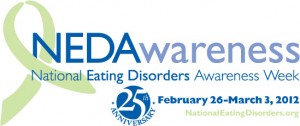February 27 – March 3 is Body Image Warrior Week. Throughout the course of this week, you’ll read posts from an inspiring group of women who fight hard against body image oppression through their own words and work.
- I am honored to introduce you to Autumn of The Beheld. I first met Autumn last year when she interviewed me for her seriously amazing blog. Ever have the type of professional conversation with someone where you were like, “Oh my goodness, we would totally be BFFs.” Well, that was how I felt after talking to Autumn. And when I read her blog? I think, “Oh my goodness, I wish I had her brain!” And, now, I get to share her brain and warmth with you. Woohoo!
- Here’s a burst of wisdom from Autumn:
“You write about body image all the time,” he said.
“No, I don’t,” I replied. “I write from the neck up.” I put my hand to my throat as emphasis, and saw a mental image of myself: Me and my writings above the neck; body image and its myriad, talented proponents below it. Except, in my mental image, my head and body were completely separate. My head was floating above my body, disconnected.
In a flash, I remembered a study I’d read last year: Women with eating disorders are more likely to draw self-portraits of themselves as disconnected. Their feet were missing or disconnected; their necks were separate from both head and body. In some cases, the self-portraits had no neck at all. The theory was that women with eating disorders—who are often thought to be overly preoccupied with their body image—in fact felt utterly out of touch with their bodies, to the point where when asked to create a literal image of their form, they didn’t dare connect their body and mind.
I’ve argued before about how eating disorders aren’t as linked to body image as many would have us believe, and it’s something I’ll continue to argue. My own experience backs this up: I went into a treatment program for an eating disorder in 2009 because I no longer knew how to eat normally, not because my body image was poor. I now know how to eat normally. I still don’t know how to truly be at peace with my body.
But by insisting that I am damn well not a body image blogger, I was drawing myself without a neck, over and over and over.
I can’t claim that recognizing my schism will make me veer more in the direction of body image. I like focusing on the neck up; it’s an area not yet as explored from a feminist perspective as our bodies. In the much-needed counterattack on women’s bodies, the potency of our faces—individually, collectively—often goes examined, and I’m eager to correct that. What I do know is that identifying my eagerness to keep the face and body separate has illuminated the impossibility of ever separating them. I knew some fellow bloggers considered me a body image writer, and I’d always thought that was just because The Beheld was difficult to categorize; now I see that they considered me a body image blogger because I am. If any of us—body image bloggers, beauty writers, feminist critics, or thoughtful readers—are to explore the issues behind appearance as thoroughly as we’d like, we owe it to ourselves to not lapse into neck-up thinking. Specifically, I owe it to myself to not treat the topic of the body as something distinct from the issues of visibility, feminine performance, and beauty that are at the core of what I try to deconstruct. Body image is important on a personal level, sure. It’s also essential as an intellectual issue: How can I look at the performance of femininity without looking at the ways in which women try to minimize space by minimizing our bodies? How can I look at modern-day incarnations of the discredited science of physiognomy without examining the personality traits we ascribe to women’s forms?
My own body image path hasn’t made it easy to consider the messy ways that body image is relevant to the more generalized topic of women and being seen. I’d rather keep my body image private, as flawed as it is, presenting it in public only when it’s tidy and shiny and perfectly wrapped (and is it any surprise that perfectionism is another key component of eating disorders?). But if I don’t start to draw a neck—today—my picture will forever be incomplete.
~~~
Eager to learn more about who is participating in Body Image Warrior Week? Check out this list of participants.





